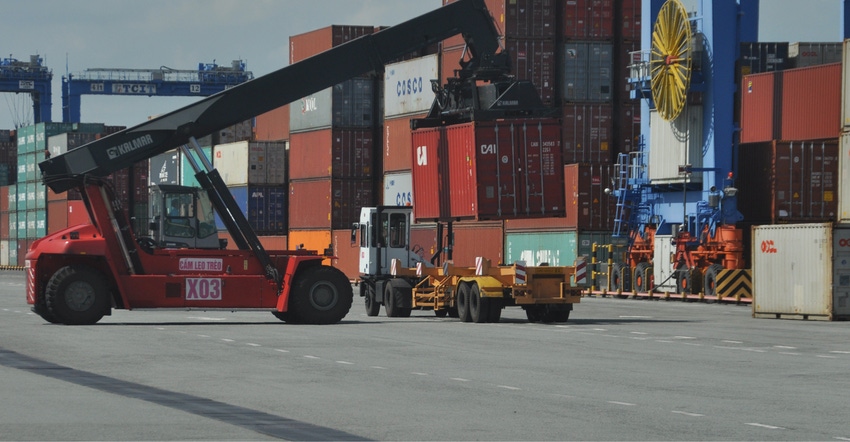
Nobody has to tell a Kansas farmer that trade is vital to the state’s economy. But just how valuable is it? A new study from Business Roundtable has quantified just what benefits international trade and investment brought to jobs and the economy in Kansas.
In 2020, the COVID-19 global pandemic has brought dual public health and economic crises and that is not included in the study which was based on data through the end of the year 2018.
The study found that international trade, including exports and imports, supported 395,500 Kansas jobs — one in five jobs in the state in 2018. Trade-related jobs grew five times faster than total employment from 1992 to 2018.
Jobs in trade-related employment pay about 16% more than jobs in less export-intensive industries, and exporting plants increase employment faster than plants that do not export and are less likely to go out of business, the study found.
Researchers found that trade supports higher wages for workers and lower costs for companies and consumers, resulting in more money to support other sectors of the economy such as education, entertainment and construction.
Kansas exports
The study found that Kansas exported $12.7 billion in goods and $3.8 billion in services in 2018, including oilseeds and grains, aerospace products and parts, meat products and travel services and that 83% percent of exporters are small and medium-sized companies with fewer than 500 workers.
Kansas is among the Top 10 state exporters in five industries, including third in meat products valued at $2 billion, fourth in oilseeds and grains at $3.1 billion, fifth in leather and hide tanning at $61 million, and sixth in animal foods at $170 million, according to the study.
Overall, Kansas is America’s sixth largest exporter of agricultural products. In addition to fourth in oilseeds and grains, Kansas is the 10th largest exporter of cattle, 18th in exports of animal products and 22nd in exports of miscellaneous crops, according to the study
Researchers also noted that 3,341 Kansas companies were exporters in 2018, with one of the fastest-growing categories being communications equipment, which has increased by 15% since 2009. In 2018, exports of these products reached $162 million.
The study found that Kansas-made goods and services were purchased by 191 countries and territories in 2018. Goods and service exports accounted for 9.8% of Kansas’s GDP in 2018 and exports have grown at an average annual rate of 2.7% since 2009.
The top markets for goods from Kansas are Mexico with $2.2 billion, Canada with $1.9 billion and Japan with $1.2 billion. Top importers of services are the U.K. with $322 million, Canada with $279 million and China with $278 million.
Growth in exports has been steady for both goods and services, researchers found. Good exports to the Philippines have grown by 11% every year since 2009, while services exports to China have grown 11% a year.
Kansas imports
Business roundtable researchers also quantified the benefit imports provided to Kansas companies and families.
In 2018, 35% of Kansas imports were consumer goods. Prices have dropped year after year from 2008 to 2018, the study found, resulting in consumers paying 88% less for televisions, 63% less for computers and 45% less for toys.
Those reductions enabled Kansas families to have more money to spend on locally provided goods and services such as housing, education and health care, the study found.
In 2018, there were 2,897 Kansas importers, buying goods from 157 countries around the world. In 2018, 65% of Kansas goods were raw materials, components and parts used by manufacturers to stay competitive. Kansas aerospace companies imported $880 million worth of jet engines and parts in 2018, while Kansas exported $2.28 billion in aerospace products in 2018.
The Roundtable report also detailed the importance of trade agreements to the growth of exports. It found that in 2018, Free Trade Agreement partners bought 12.1 times more goods per capita from Kansas than non-FTA partners.
For Kansas, the North American Free Trade Agreement resulted in immense growth of exports, with purchases by Canada and Mexico increasing 361% since it went into effect in 1994 while Kansas exports to Singapore have increased by 159% since an FTA went into effect in 2004.
Exports of Kansas meat products to Korea have increased from $193 million to $298 million since the FTA went into effect in 2012.
In 2018, $5.7 billion of Kansas’ goods exports or 45% went to FTA partners, an increase of 26% since 2009.
The report also found that foreign investments in Kansas are valuable to job creation. In Kansas, there are 60,800 workers employed by foreign-owned companies. There are 10,000 workers employed by companies based in Japan; 7,700 workers are employed by Canadian companies, 7,400 workers are employed by U.K.-based companies; 6,300 workers are employed by companies in Switzerland and 6,100 workers are employed by companies based in Germany, the report found.
About the Author(s)
You May Also Like






